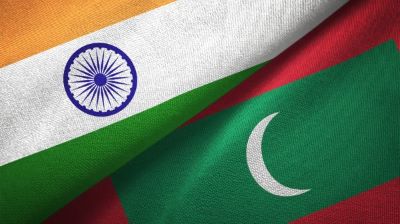Context-
India-Maldives relations have entered a complex phase following the assumption of President Muizzu's government, marked by controversial remarks from Maldivian ministers targeting India and Prime Minister Narendra Modi. These statements triggered a social media campaign in India urging a boycott of Maldives. President Muizzu responded by asserting Maldives' sovereignty and denouncing perceived bullying, leading to a visible strain in bilateral diplomacy.
Although Muizzu is signaling a return to normalcy in the Maldives-India equation, his larger goal of reducing his country’s reliance on India still stands.
Maldives: Diverse avenues of engagement
In today's evolving global landscape, smaller nations like the Maldives are exploring diverse avenues of engagement beyond historical associations and geographical proximity. Despite the initial turbulence driven by election rhetoric, long-standing partnerships often recalibrate post-election to focus on governance and strategic cooperation, aiming for normalization.
President Muizzu's administration is actively diversifying Maldives' international engagements to reduce reliance on India. This strategic shift involves exploring defense agreements with countries like Türkiye for drone procurement and seeking health insurance collaborations with the UAE and Thailand for Maldivian hospitals. Nevertheless, signs of India-Maldives relations returning to normalcy are beginning to emerge.
Muizzu's Reassurance: India as Closest Ally
President Muizzu's recent affirmations highlight India's enduring importance as the Maldives' closest ally. Despite previous disagreements over the presence of Indian military personnel, Muizzu's conciliatory approach signifies a willingness to engage in constructive dialogue and collaboration. Resolving the withdrawal of Indian military staff from certain installations, a key campaign promise by Muizzu, is progressing through compromise, showcasing a diplomatic breakthrough.
The third meeting of the High-Level Core Group underscores efforts to mend relations. Both countries acknowledged progress in replacing Indian military personnel with civilians at aviation platforms, indicating mutual cooperation beyond past disputes. Discussions also encompassed enhancing development projects, trade, investment, and people-to-people linkages, showcasing a renewed commitment to comprehensive bilateral cooperation.
Bilateral Engagements and Regional Dynamics
Recent trilateral exercises like 'Dosti 16' and Maldives' participation in India's Milan Naval Exercises highlight a concerted effort to move beyond differences and strengthen regional maritime security cooperation. These exercises, initiated in 1991, reaffirm longstanding collaboration in search and rescue, counter-piracy, and disaster relief efforts, promoting stability in the Indian Ocean region.
Despite certain shifts in Maldives' foreign policy, such as opting out of certain regional meetings and agreements, hosting joint maritime exercises with India underscores a commitment to regional security and cooperation. The presence of Chinese vessels near Malé has triggered regional discussions, yet Maldives' reassurances regarding port calls emphasize the country's balanced approach amidst evolving geopolitics.
Development Initiatives and Economic Prospects
Significant infrastructure projects like the Thilamale Bridge, constructed by Indian companies, represent vital connectivity enhancements for the Maldives. Although facing delays, progress on this project aligns with President Muizzu's commitment to expedite key developments. Upon completion, the bridge will alleviate urban overcrowding, spur economic growth, and address youth unemployment, all vital for the Maldives' sustainable development.
However, the looming foreign debt crisis remains a critical concern for Maldives. President Muizzu's efforts to diversify partnerships and seek alternative solutions demonstrate a strategic realignment in foreign policy. Despite this, smoothing relations with India appears beneficial given the urgent need for debt relief measures. India's role as a reliable development partner is pivotal in addressing pressing issues like rising fuel prices and youth unemployment in the Maldives.
Conclusion
In conclusion, while India-Maldives relations have encountered recent challenges, President Muizzu's government is actively pursuing diplomatic normalization. Despite exploring alternative partnerships, India continues to play a crucial role as the Maldives' primary ally. Strategic engagements like the High-Level Core Group meetings and joint military exercises signify a renewed commitment to collaboration and regional stability.
Moving forward, addressing mutual concerns and fostering inclusive development initiatives will be instrumental in solidifying the partnership between India and the Maldives. As geopolitical dynamics evolve, both nations have the opportunity to redefine their relationship based on shared interests and strategic cooperation, ensuring a sustainable and mutually beneficial alliance in the Indo-Pacific region. The prospects for enhanced economic integration and socio-political collaboration bode well for the future trajectory of India-Maldives relations, underlining the significance of diplomatic recalibration in an evolving global order.
|
Probable questions for UPSC Mains Exam- 1. Discuss the key challenges and opportunities in India-Maldives relations under President Muizzu's administration. How is Maldives diversifying its international engagements while maintaining a strategic partnership with India? (10 marks, 150 words) 2. Analyze the significance of recent bilateral engagements and regional exercises, such as 'Dosti 16', in restoring normalcy in India-Maldives relations. How do these initiatives contribute to maritime security cooperation and stability in the Indian Ocean region? ( 15 marks, 250 Words) |







